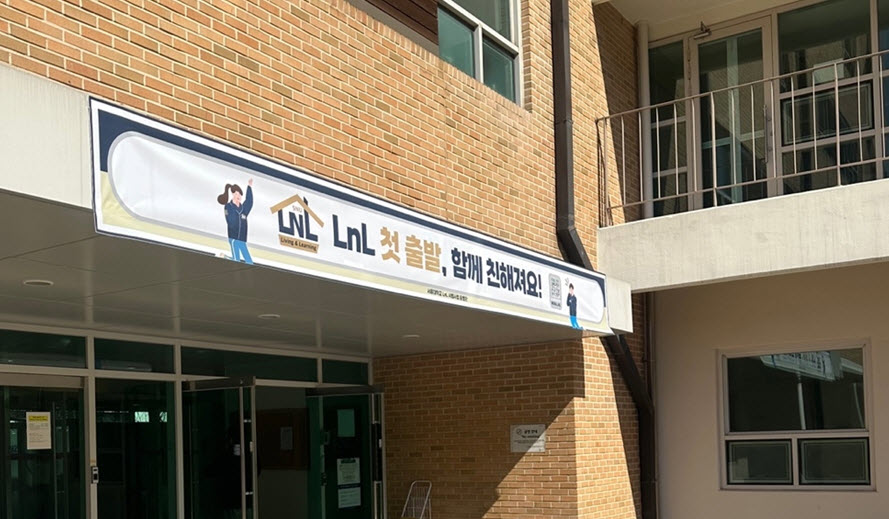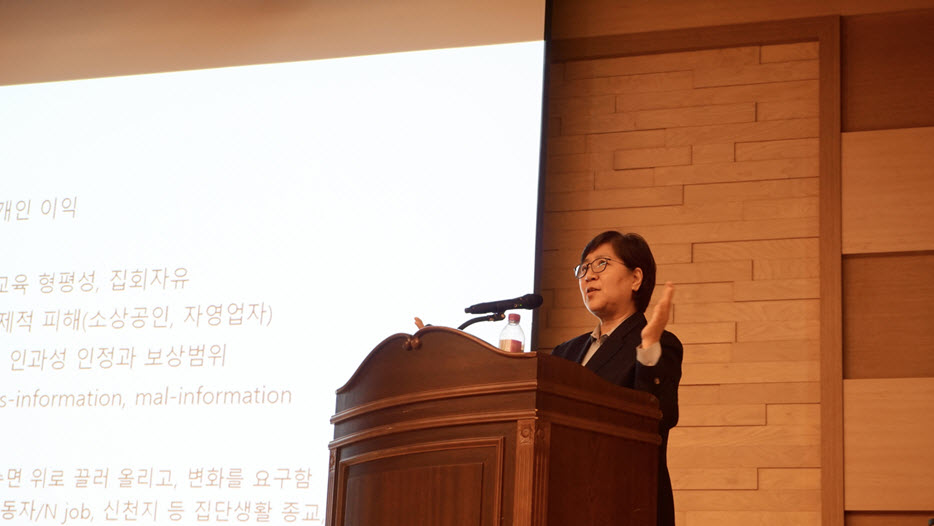This year, Seoul National University introduced the Residential College (RC) pilot program called LnL, which stands for "Living and Learning." The program aims to integrate living and education for a holistic learning experience. Over 300 individuals are currently participating in LnL, including 248 newly admitted students selected through a lottery system from a pool of over 1,000 applicants, as well as 39 undergraduate and graduate student assistants who were chosen through interviews. The students are organized into 13 classes, providing them with opportunities to not only get acquainted with one another but also to explore various subjects, including the importance of collaboration and teamwork.

Gwanaksa Building No. 906 where RC pilot program, LnL is proceeded
LnL, Seoul National University's Residential College, make the rules together
RC programs have been implemented by numerous universities, but Seoul National University distinguishes itself by granting students the autonomy to establish their own rules. While most universities, including other dormitories within Seoul National University, have pre-existing dormitory regulations, students often feel compelled to conform passively to the established system. However, at LnL, apart from essential rules addressing violence and theft, students are encouraged to devise their own problem-solving strategies and establish their own rules through "Debate Nights." By empowering students to actively address conflicts, they are motivated to contemplate deeply on the characteristics of an ideal community. Kim Kyung-mi, the professor overseeing the LnL pilot project, stated, "We believe that experiencing communal living and resolving diverse conflicts is essential for cultivating a sense of shared values, rather than fostering individual self-interest."
Learning communal values and broadening knowledge
LnL places equal emphasis on both living and learning, offering the LnL Gwanak Omnibus Course in the first semester and the LnL Student-led Seminar in the second semester to foster a broader understanding. The Gwanak Omnibus Course in the first semester aims to delve into communal values through lectures and discussions with classmates. On May 17th (Wednesday), a guest lecture was delivered by Jung Eun-Kyung, the former commissioner of the Korea Disease Control and Prevention Agency, titled "Pandemic and K-prevention." The lecture prompted reflections on the impact of COVID-19 on our society, which has undergone significant changes and raised numerous challenges. Jung emphasized that while the initial response to the pandemic was commendable due to previous experience with infectious diseases, it also exposed underlying societal issues. The lecture shed light on various social problems stemming from the pandemic, such as educational disparities and conflicts between individual and collective values. These issues persist as ongoing challenges that demand our attention. Additionally, students had the opportunity to attend lectures on diverse subjects, including "Climate Change," "Contemplating Community," and "University Experiences," enabling them to contemplate communal values from multiple perspectives.

Gwanak Omnibus Course Lecture by Jung Eun-kyung, former commissioner of the Korea Disease Control and Prevention Agency
While the Gwanak Omnibus Courses follow pre-determined topics, the Student-Led Seminars in the second semester offer students the freedom to choose and explore subjects of their personal interest. Professor Kim highlighted the significance of the LnL Student-Led Seminar, stating, "I believe it is an essential activity for nurturing talents as students discuss and debate topics within their areas of expertise, ultimately generating academic outcomes."
As a result of receiving a diverse range of topics from students, regardless of their majors, seminars were conducted on various subjects. Examples include directing a theater production, exploring Japanese language and culture, understanding economy through the stock market, and developing a software application that caters to community needs. Of particular note is the seminar titled "Exploring and Applying Education Utilizing Media for Effective Korean Language Learning," which allows students to delve into Korean language education for foreigners, utilizing video materials such as Korean dramas and K-pop as educational media. Throughout the seminar, students receive guidance from professors and teaching assistants to develop their own seminars and produce a final research report. Professor Kim expressed, "While freshman seminars have existed in the past, it is rare for freshmen to have the opportunity to choose their own topics and lead their own research, making this experience truly valuable."
Ji-won Kim, a student from the Department of Education, expressed her positive experience with LnL, stating, "I had the opportunity to interact with peers from various majors whom I wouldn't typically meet through regular school activities." She further emphasized the benefit of being able to collaborate on assignments and spend time together outside of class. Ji-won Kim's enthusiasm for participating in LnL highlights the program's potential in fostering interdisciplinary connections and promoting a sense of community among students.
While LnL is still in its early stages, its objective of facilitating interactions between students from diverse fields and exploring communal values represents a significant milestone in the future of higher education. The anticipation for LnL's future initiatives and endeavors is palpable, as it continues to provide a unique and enriching experience for students.
Translated by
Seulki Yeo
(Department of Russian Language and Literature)
seulkiyeo@snu.ac.kr

